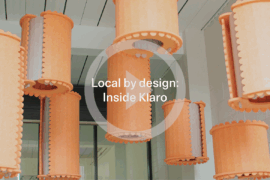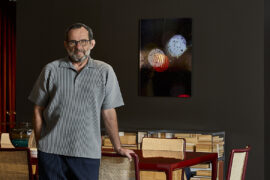Seeing one of its products copied by a national retailer, Made by Pen shares an opinion piece with Indesign on the replica industry and how one way of fighting back is through design integrity.
August 30th, 2018
Designers of innovative, popular, and beautiful products are, unfortunately, well aware of the modern phenomenon of knock-offs, which are so prevalent these days.
Decades ago, when a designer created a fashion item, a piece of furniture, a textile print, or any other type of creative item, admirers would purchase the item at its deserved market price. Today, however, low-priced imitations flood the market, some are brazenly sold without apology while others dupe the consumer, convincing they are somehow ok by promoting them as a branded-replica.
While knock-offs continue to pour into the consumer market, a discerning eye will always be able to tell an original from an imitation. Why? The answer lies in design integrity, which is the artistry, the design foundation, form and principals, that defines an item from its very inception. And that is something that is impossible to fake.
At Made By Pen, we were recently made aware just how important design integrity is to our products. To our surprise, we discovered that a major retail chain has imitated our inaugural product – The Dog Room, which is an original, high-quality designed dog kennel. And this retailer is selling it at a fraction of the cost.
While both items feature a clean-lined shape and lightweight construction, but our innovative design expresses a level of finesse that a retail chain could not copy. Let’s take a look at why.
First, Made By Pen’s principal philosophy rests on collaborative efforts with leading designers and architects. The Dog Room design was conceived by award-winning architect Michael Ong, a professional with extensive experience in residential architecture, which fueled his ideation process.
Furthermore, Michael Ong did not simply come up with a design for the kennel, he applied his many years of structural training, design insights and intellect, and continuous inquisitive observations of design principals into the blueprint. Made By Pen expertly guided the collaboration through drawing on the team’s expertise by identifying the market opportunity, the research and interrogation of the idea prior to collaborating with Michael Ong. It is only then, with this considered partnership of expertise, did the Dog Room come to life.
Moving past ideation, research, and design procedures, a quality original will go through a number of stages before it’s ready for the end consumer to admire. A prototype of the design will be tested, with as many subsequent refinements as necessary being executed to make it perfect. Materials will be carefully selected to best suit the construction’s purpose. The item will go through consumer testing, and there is also a process of determining pricing not to mention developing an appropriate marketing plan.
Contrast this with an inexpensive dupe. Whether we are discussing a handbag, sunglasses, an evening gown, or The Dog Room – the cheaper duplicate will not have any of this integrity. Since it is simply a copy, there is no original thought to the design (save a desire to create a ‘look’ at a lower cost). Likely the materials will be sourced for price, not function. There is no concern for the longevity of the item, nor any effort to refine it to make sure it’s the best possible iteration of the initial concept.
Imitations or poor-quality knock-offs only confirm our position that we must stem the throw-away attitude of the society we live in today.
At Made By Pen, we advocate for, and will continue to champion and educate on the integrity of design. We believe that integrity is visible to even an untrained eye, and creates a refined and distinctive impact that is impossible to ‘knock-off.’
Leanne Amodeo reported on the real vs fake debate back in 2016, have a read through now to get a picture of the landscape.
INDESIGN is on instagram
Follow @indesignlive
A searchable and comprehensive guide for specifying leading products and their suppliers
Keep up to date with the latest and greatest from our industry BFF's!

In a tightly held heritage pocket of Woollahra, a reworked Neo-Georgian house reveals the power of restraint. Designed by Tobias Partners, this compact home demonstrates how a reduced material palette, thoughtful appliance selection and enduring craftsmanship can create a space designed for generations to come.

Merging two hotel identities in one landmark development, Hotel Indigo and Holiday Inn Little Collins capture the spirit of Melbourne through Buchan’s narrative-driven design – elevated by GROHE’s signature craftsmanship.

At the Munarra Centre for Regional Excellence on Yorta Yorta Country in Victoria, ARM Architecture and Milliken use PrintWorks™ technology to translate First Nations narratives into a layered, community-led floorscape.

In an industry where design intent is often diluted by value management and procurement pressures, Klaro Industrial Design positions manufacturing as a creative ally – allowing commercial interior designers to deliver unique pieces aligned to the project’s original vision.

Celebrating ten years of creative impact, Melbourne Design Week 2026 invites designers, studios, and collectives to submit expressions of interest for its statewide program and the Melbourne Art Book Fair.

With experience across fashion, styling and interiors, Nicholas Gilbert launches Studio Nicholas with a mission to elevate Australian design on the world stage — and to champion a more rigorous, professional future for the industry.
The internet never sleeps! Here's the stuff you might have missed

Following his appointment as Principal at Plus Studio’s Sydney office, architect John Walsh speaks with us about design culture, integrated typologies and why stretching the brief is often where the most meaningful outcomes emerge.

As Roberto Palomba visits Australia, Space Furniture unveils a 450-square-metre apartment installation that positions Kartell not as a collection of objects, but as a complete way of living.